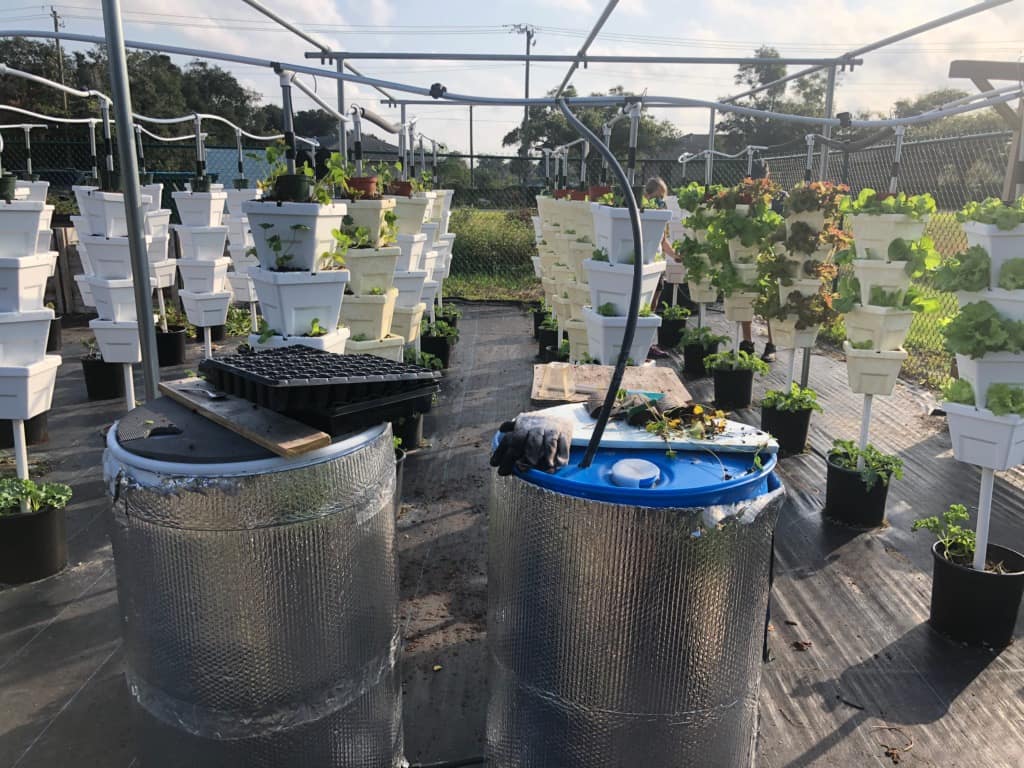Eagles to Design, Build Solar Panels at Derbyshire Community Garden

After the earthquake that struck Haiti in 2010, a group of Embry-Riddle Aeronautical University students approached Dr. Marc Compere, associate professor of Mechanical Engineering, with the idea of using their Engineering skills to provide humanitarian aid. They installed their first water filtration system that summer and have returned nearly every year since to develop partnerships with Haitian counterparts, design water and solar purification technology and start business training in the communities.
Now, after working abroad for almost a decade, the group, dubbed Project Haiti, is expanding its mission to serve locally.
Looking Inward to Repurpose Grant Funding
Project Haiti was awarded grant funding from the Ford C3 Foundation to begin work in Arcahaie, Haiti, but travel restrictions imposed by the U.S. State Department as well as the outbreak of Covid-19 the following year prevented them from going. Derbyshire Community Garden was brought to their attention by faculty mentor and Honors Program Director Dr. Geoffrey Kain, who has been instrumental in the success of Project Haiti over the past five years.
Dr. Kain has also been leading students in the garden to teach about regenerative agriculture. Students assist in food production and have started their own farmer’s market, helping to provide fresh produce to the residents of north Daytona Beach, Florida.
Dr. Compere saw an opportunity for Project Haiti to fulfill its mission in a new setting, and decided that they should install solar panels to help with the electrical costs of running Derbyshire Place.
“This focus on improving community health and stimulating the local economy is identical to Project Haiti’s mission,” he said. “Instead of just canceling Project Haiti for a third year in a row, we decided to act locally. This will still give our students experience installing a solar power system, and it supports the Derbyshire Community Garden.”
Half of the Ford C3 Foundation grant will go toward installing the solar panels, while the other half will be used to purchase a solar-powered water purifier to ship to Haiti.
A Food Desert in an Ocean Paradise
Derbyshire Place is a faith-based community center that offers services such as enrichment programs, recreational activities, support groups, free meals and job training to local families.
“We implement intentional programming and outreach aimed at helping this very underserved community,” said Miguel Rodriguez, executive director of Derbyshire Place. “We deal with food-security issues, job security, safe spaces for children and more.”
In addition to a high unemployment rate, the neighborhood surrounding Derbyshire Place lies within a food desert, meaning supermarkets or grocery stores that offer produce are few and far between. There may be an abundance of fast-food chains in the area, but access to fruits and vegetables is limited. Not having a steady supply of nutritious food has associated health risks. According to a Florida State Health Department profile, the area shows increased rates of heart disease, stroke, diabetes, chronic lower respiratory disease, lung cancer, breast cancer, colorectal cancer and prostate cancer. It also shows higher instances of pre-term births, low birth weight and infant mortality.
The Derbyshire Community Garden seeks to address these alarming statistics by engaging people in outdoor gardening and securing their access to healthy food. In addition to growing their own produce, residents will have the opportunity to learn about nutrition and build fellowship with one another.
A Win-Win…Win-Win-Win
Emphasizing the benefits of the solar panel project to all involved, Dr. Compere called it a “win-win-win-win-win.” Derbyshire Place relies on donations to fund its programs, and there is often not enough money left at the end of the month to invest in facility upgrades and classroom materials, let alone to keep the lights on. The solar panels are expected to cut the center’s electrical bill in half.
“With the additional savings, we plan on buying more food, backpacks and back-to-school items to give away,” Rodriguez said.
The project will also give Embry-Riddle students a chance to apply what they’ve learned from their engineering courses and gain hands-on experience on the logistical side: site planning, permitting, installation, etc.
“The solar display will draw more people into the garden,” Dr. Kain said. “It may have a broader educational purpose for school groups, instructional workshops and people who rent garden beds. This is a significant advancement toward clean, renewable energy that supports localized food production.”
Both he and Dr. Compere are excited to watch their students go beyond campus boundaries and uphold Embry-Riddle’s commitment to social responsibility. The project is awaiting permits, but the installation is expected to happen next month.
“It’s a great idea that makes this little oasis a special place in a location that is otherwise largely neglected,” Dr. Kain added.
